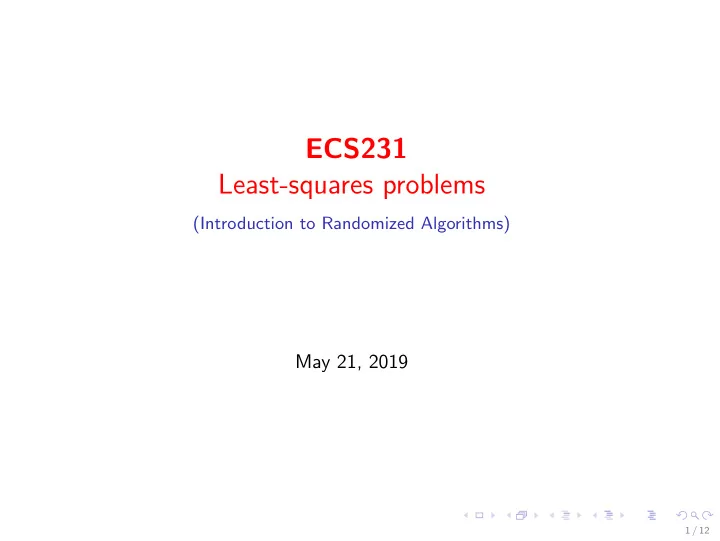

ECS231 Least-squares problems (Introduction to Randomized Algorithms) May 21, 2019 1 / 12
Outline 1. linear least squares – review 2. Solving LS by sampling 3. Solving LS by randomized preconditioning 4. Gradient-based optimization – review 5. Solving LS by gradient-descent 6. Solving LS by stochastic gradient-descent 2 / 12
Review: Linear least squares ◮ Linear least squares problem min x � Ax − b � 2 ◮ Normal equation A T Ax = A T b ◮ Optimal solution x = A + b 3 / 12
Solving LS by sampling ◮ MATLAB demo code: lsbysampling.m >> ... >> A = rand(m,n); b = rand(m,1); >> sampled_rows = find( rand(m,1) < 10*n*log(n)/m ); >> A1 = A(sampled_rows,:); >> b1 = b(sampled_rows); >> x1 = A1\b1; >> ... ◮ Further reading: Avron et al, SIAM J. Sci. Comput., 32:1217-1236, 2010 4 / 12
Solving LS by randomized preconditioning ◮ Linear least squares problem x � A T x − b � 2 min ◮ Normal equation ( AA T ) x = Ab ◮ If we can find a P such that P − 1 A is well-conditioned, then it yields x = ( AA T ) − 1 Ab = P − T · ( P − 1 A · ( P − 1 A ) T ) − 1 · P − 1 A · b 5 / 12
Solving LS by randomized preconditioning ◮ MATLAB demo code: lsbyrandprecond.m >> ... >> ell = m+4; >> G = randn(n,ell); >> S = A*G; % sketching of A >> [Q,R,E]=qr(S’); % QR w. col. pivoting S’*E = Q*R >> P = E*R(1:m,1:m)’; % preconditioner P >> B = P\A; >> PAcondnum = cond(B) % the condition number >> ... ◮ Further reading: Coakley et al, SIAM J. Sci. Comput., 33:849-868, 2011 6 / 12
Review: Gradient-based optimization ◮ Optimization problem x ∗ = argmin f ( x ) x ◮ Gradient: ∇ x f ( x ) The first-order approximation f ( x + ∆x ) = f ( x ) + ∆x T ∇ x f ( x ) + O ( � ∆x � 2 2 ) ∂α f ( x + αu ) = u T ∇ x f ( x ) ∂ Directional derivative: ◮ To min f ( x ) , we would like to find the direction u in which f decreases the fastest. Using the directional derivative, f ( x + αu ) = f ( x ) + αu T ∇ x f ( x ) + O ( α 2 ) Note that u,u T u =1 u T ∇ x f ( x ) = min u,u T u =1 � u � 2 �∇ x f ( x ) � 2 cos θ min = −�∇ x f ( x ) � 2 when u is the opposite of ∇ x f ( x ) . Therefore, the steepest descent direction u = −∇ x f ( x ) . 7 / 12
Review: Gradient-based optimization, cont’d ◮ The method of steepest descent x ′ = x − ǫ · ∇ x f ( x ) , where the “learning rate” ǫ can be chosen as follows: 1. ǫ = small const. 2. min ǫ f ( x − ǫ · ∇ x f ( x )) 3. evaluate f ( x − ǫ ∇ x f ( x )) for several different values of ǫ and choose the one that results in the smallest objective function value. 8 / 12
Solving LS by gradient-descent ◮ Minimization problem 1 2 � Ax − b � 2 min x f ( x ) = min 2 x ◮ Gradient: ∇ x f ( x ) = A T Ax − A T b ◮ The method of gradient descent: ◮ set the stepsize ǫ and tolerance δ to small positive numbers. ◮ while � A T Ax − A T b � 2 > δ do x ← x − ǫ · ( A T Ax − A T b ) ◮ end while 9 / 12
Solving LS by gradient-descent MATLAB demo code: lsbygd.m >> ... >> r = A’*(A*x - b); >> xp = x - tau*r; >> res(k) = norm(r); >> if res(k) <= tol, ... end >> ... >> x = xp; >> ... 10 / 12
Solve LS by stochastic gradient descent ◮ Minimization problem: n 1 1 2 � Ax − b � 2 � x ∗ = argmin 2 = argmin f i ( x ) = argmin E f i ( x ) n x x x i =1 2 ( � a i , x � − b i ) 2 and a 1 , a 2 ... are the rows of A . where f i ( x ) = n ◮ Gradient: ∇ x f i ( x ) = n ( � a i , x � − b i ) a i . ◮ The stochastic gradient descent (SGD) method solves the LS problem by iterative moving in the gradient direction of a selected function f i k : x k +1 ← x k − γ · ∇ f i k ( x k ) where index i k is selected randomly in the k th iteration: ◮ uniformally at random, or ◮ weighted sampling 1 1 D. Needell et al, Stochastic gradient descent, weighted sampling, and the randomized Kaczmarz algorithm, Math. Program. Ser. A (2016) 155:549-573. 11 / 12
Solve LS by stochastic gradient descent MATLAB demo code: lsbysgd.m >> ... >> s = rand; >> i = sum(s >= cumsum([0, prob])); % with probability prob(i) >> dx = n*(A(i,:)*x0 - b(i))*A(i,:); >> x = x0 - (gamma/(n*prob(i)))*dx’; % weighted SGD >> ... 12 / 12
Recommend
More recommend